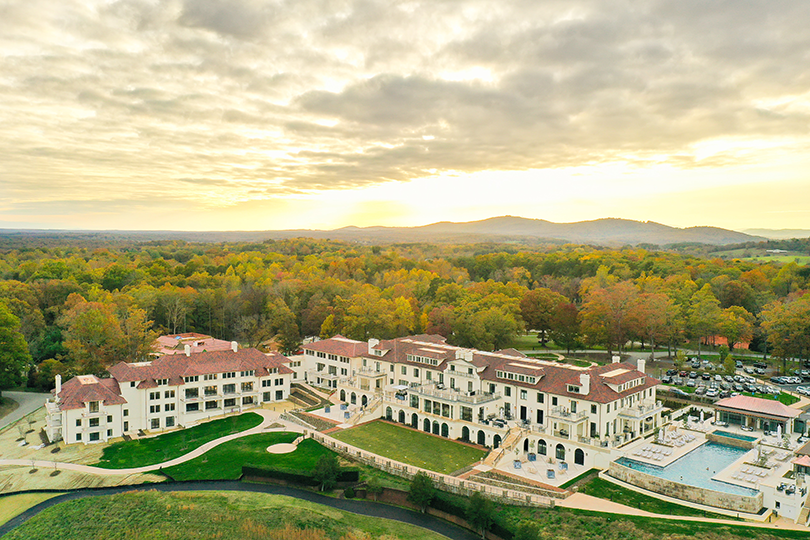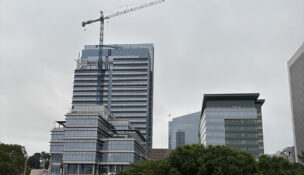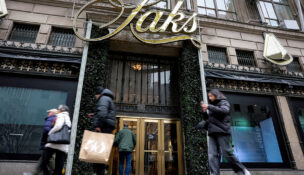Under the radar
Charlottesville defense sector has stealthy presence, big impact
Sydney Lake //April 30, 2023//
Under the radar
Charlottesville defense sector has stealthy presence, big impact
Sydney Lake //April 30, 2023//
Considering that four of the world’s five largest defense contractors are headquartered in Northern Virginia and that Hampton Roads is home to the world’s largest naval base, it isn’t surprising that Virginia was ranked the top state in the nation for defense spending in 2021.
But what many observers may not know is that quiet, academic Charlottesville has a booming defense industry that’s been growing for decades.
In Charlottesville, the total direct and indirect regional economic impacts from defense spending accounted for $1.2 billion in 2021, according to a study exclusively released to Virginia Business by the University of Virginia and the Charlottesville Regional Chamber of Commerce.
Conducted by the Weldon Cooper Center for Public Service at U.Va., the study found that the defense industry in Charlottesville and surrounding Albemarle and Greene counties directly accounted for 3,972 jobs, $421 million in labor income, $501 million in value-added income and $642 million in economic output in 2021. When including indirect impacts from the defense industry in the Charlottesville region, the total economic impact in 2021 included 7,347 jobs, $618 million in labor income, $831 million in value-added income and $1.2 billion in economic output.
This makes defense the second largest industry in Charlottesville behind only higher education. (U.Va.’s annual economic impact is nearly $6 billion, according to the university.)
Defense is “a quiet sector in our community,” says Deborah van Eersel, the U.Va. Foundation’s chief administrative officer and director of marketing. “People don’t really know how much it contributes to the community’s well-being.”
The Weldon Cooper study, which cost roughly $20,000, was conducted at the request of the Defense Affairs Committee (DAC) of the Charlottesville Regional Chamber of Commerce and funded by Albemarle County, the U.Va. Foundation and the city of Charlottesville.
‘Secret Squirrel’
National defense spending has increased steadily since the Sept. 11, 2001, terrorist attacks, having grown from $320.09 billion in 2000 to $800.67 billion by 2021, with $62.7 billion going to Virginia alone that year.
Previous economic impact studies focused on defense have looked at all of Virginia or at the robust defense spending in Hampton Roads or Northern Virginia. But those reports don’t often capture the whole story of the defense industry’s impact in Virginia, especially in the Charlottesville region, which is home to Rivanna Station, an Albemarle County sub-installation of Fort Belvoir in Fairfax County. Three of the top military intelligence gathering agencies — the Defense Intelligence Agency (DIA), the National Ground Intelligence Center (NGIC) and the Geospatial-Intelligence Agency (NGIA) — have a presence at Rivanna Station.
“A lot of what we have [in the Charlottesville region] is what I call ‘Secret Squirrel’ stuff, mostly intelligence units and elements and people. They don’t and can’t really speak to what they do,” explains retired U.S. Army Col. Lettie Bien, who is the Charlottesville Regional Chamber of Commerce’s inaugural defense affairs program manager. “Hence, this community did not see how robust the defense community was here in the Charlottesville/Albemarle region.”
Working with van Eersel, the chamber and university decided that for the community to “really get behind and support the defense space, they really needed to understand and know the true economic value that it brings to our area,” Bien says. “That became the impetus for having the report.”
While the defense sector has largely started growing nationally during the past two decades, the industry really arrived in Charlottesville in the late 1960s, explains Chris Engel, director of economic development for the city of Charlottesville. This is when NGIC was known as the U.S. Army Foreign Science and Technology Center (FSTC). Created in the mid-’90s from the merger of FSTC and the U.S. Army Foreign Science and Technology Center, NGIC was once located just off the downtown mall in Charlottesville, but it outgrew that space and moved to Rivanna Station in Albemarle, Engel says.
Charlottesville’s defense sector boomed following 9/11.
“We had significant growth here related to Rivanna Station after 9/11,” van Eersel says. “Then the country went to war in both Afghanistan and Iraq, and they brought personnel down to work out of the station and brought contractors then to help support their mission in those places.”
Proximity to D.C.
Another reason the defense industry in Charlottesville has largely remained under wraps is that many of its workers are civilians performing intelligence or government contracting work.
Contractors with a presence in the area include McLean-based Fortune 500 firm Booz Allen Hamilton Holding Corp., which employs more than 150 people at its Charlottesville office, where it primarily does contract work for defense and intelligence community clients, says Bryan Shrader, senior vice president at Booz Allen. Work includes designing, developing and implementing digital, cloud-based, advanced analytics and other technologies for defense and intelligence clients.
“Charlottesville is a great location for Booz Allen and our clients,” he says. “It has a strong base of highly technical talent, reasonable proximity to the National Capital Region (NCR) and wonderful culture and charm — all of which draws people to the area.”
Roughly 100 miles from the nation’s capital, Charlottesville is a desirable location for the defense and intelligence industry, say Bien and van Eersel.
“One of the things that the government has wanted to do is to not have all of its assets located within a hundred-mile radius of … D.C., the capital region,” van Eersel explains. “The idea is that if we had a strike, they want to be far enough away so that their assets could not be damaged by a bomb or some sort of a terrorist attack.”
Booz Allen largely hires locally or employs workers who are planning to relocate to the Charlottesville region. “This often makes our job hiring top technical talent a bit easier than some of the other non-NCR geographies where Booz Allen and our clients operate,” Shrader says.
Falls Church-based Fortune 500 defense giant Northrop Grumman Corp., the world’s fourth largest defense contractor, also maintains a significant presence in Charlottesville. Northrop Grumman employs almost 500 people in the Charlottesville region in engineering, manufacturing, finance and program management jobs supporting contracts with the U.S. Navy and U.S. Coast Guard. The company’s work in the region largely focuses on electronic mission systems as well as machinery control and bridge systems, explains Rudy Fernandez, an operating unit director and Charlottesville site lead with Northrop Grumman.
“Charlottesville has a diverse workforce, from touch labor to high-end engineering; that aligns well with the needs of our business,” he says, adding that “Charlottesville’s proximity to the government customer located in the D.C. area is beneficial to both the customer and the business.”
Deep talent pool
Northrop Grumman and Booz Allen, as well as other Charlottesville-region defense contractors, are focused on hiring veterans. About 10% to 20% of Northrop Grumman’s workforce in Albemarle are former service members, Fernandez says. Companywide, veterans comprise nearly 28% of Booz Allen’s total workforce, Shrader says.
“Frankly, people who retire out of the military — particularly if they’re in Northern Virginia — find that this is a great place for them to come and [eventually retire],” Bien adds. “For those who are just getting out [of the military], they find that Charlottesville is also a great place to start a business, particularly if it’s going to be in the defense space.”
Defense sector jobs are attractive to veterans and civilians alike. As of 2020, the average wage for defense sector workers in the Charlottesville region was more than $104,000, according to the Central Virginia Partnership for Economic Development (CVPED).
“A lot of the folks are very well-educated and have a high level of skill,” says CVPED President Helen Cauthen, adding that her organization is also working to retain area veterans. “We’ve had some success with that, where the folks get down here … and realize they really like Central Virginia and they end up living here and potentially taking other jobs here because it’s a great workforce.”
While most of the defense industry in Charlottesville is related to Rivanna Station, the region’s surrounding counties also are working to attract more defense contractors. In August 2020, the Greene County Board of Supervisors approved a defense production zoning overlay across the whole county, a state designation that provides incentives such as tax reductions and permitting fee grants to defense contractors.
“The defense industry as a whole has had a positive impact — I don’t want to say [a] significant impact because it’s still a growing impact in Greene,” says Alan Yost, the county’s director of economic development and tourism. “With the Rivanna Station only being a few miles from our border, there are several defense companies that have settled into the Greene County area.”
Since the county implemented the defense production zoning, a few defense businesses have examined relocating to Greene, Yost says. “They ended up not coming here for different reasons, but it’s bringing more and more attention to our county’s designation as a defense production zone,” he says. “Rivanna Station is bringing a lot of defense contractors into the area, but it’s not just Rivanna Station. It’s the energy that they create that brings other defense industry partners here for different reasons.”
Having access to a nearby major academic institution also helps the defense sector in Charlottesville.
“The talent pool coming out of the university is really high quality,” van Eersel says, adding that there are pre-grad internship opportunities for U.Va. students.
For example, students from the Frank Batten School of Leadership and Public Policy often have internships or field study experiences with national security groups and defense contractors in the Charlottesville region.
Defense is also one of the top industries for internships for U.Va. engineering students, second only to internet and software jobs. Engineering students — both undergraduate and graduate — are in demand from the local defense industry, with new hires earning an average of $70,000 to $85,000 per year after graduation performing engineering, research and data analytics jobs, according to U.Va. Some of the top defense recruiters at U.Va. include DIA, BWXT, Naval Air Systems Command, Leidos, Battelle and Booz Allen.
“They can begin to be recruited by the government, and then their security clearances are worked on. By the time they graduate from university, they’re ready to go,” van Eersel says.
U.Va. also is home to the Judge Advocate General’s Legal Center and School, commonly called the JAG School. Located on campus, the federal service academy operates independently of U.Va. and educates military and civilian personnel to become military lawyers.
U.Va. itself also benefits directly from defense spending, Bien adds, in the form of Department of Defense research grants, contract spending, GI Bill student tuition spending, household incomes of DoD personnel enrolled at the university, ROTC program spending and university startups resulting from DoD-sponsored funds.
Located in Charlottesville, too, is the Federal Executive Institute, an executive management development and training center for federal government workers. “It’s where the government sends its senior civilians for leadership and government training,” Bien says. “People within the defense [industry] always know what the Executive Institute is. That adds to the mystique of why Charlottesville is so great for [the defense industry].”

Charlottesville at a glance
Widely known as home to Thomas Jefferson’s Monticello estate and the University of Virginia, the Charlottesville region is located about 65 miles west of Virginia’s state capital. The city was founded in 1762, with the Jefferson-designed U.Va. campus founded 57 years later. The city and surrounding counties are also popular for vineyards and breweries as well as access to the Blue Ridge Mountains. The largest industries in Charlottesville include higher education, health care, defense, and hospitality and tourism.
Population
Charlottesville: 45,672
Albemarle County: 113,535
Greene County: 20,552
Top employers
University of Virginia/UVA Health
Sentara Healthcare
U.S. Department of Defense
Northrop Grumman Corp.
Crutchfield Corp.
CFA Institute
Major attractions
Monticello, the home of America’s third president and author of the Declaration of Independence, is a UNESCO World Heritage Site that draws visitors from around the globe. You can see the distinctive Jefferson-designed Rotunda at the University of Virginia. Charlottesville’s Downtown Mall is a good place to visit for eating, shopping and socializing. Take in the natural beauty of the surrounding Blue Ridge Mountains along Skyline Drive and the Blue Ridge Parkway and at Shenandoah National Park. Hikers will savor the Instagram-worthy views from Spy Rock and Humpback Rocks. Take a break from picking apples and peaches at Carter Mountain Orchard by listening to live music and eating apple cider doughnuts. Or take a tasting tour through area vineyards like Jefferson Vineyards, Trump Winery, Blenheim Vineyards and Pippin Hill Farm & Vineyard.
Top convention hotel
Boar’s Head Resort
175 guest rooms
22,000 square feet
of meeting space
Boutique/luxury hotels
Kimpton The Forum Hotel
Albemarle Estate at Trump Winery
The Graduate Charlottesville
Keswick Hall
Quirk Hotel Charlottesville
Oakhurst Inn
The Draftsman
Notable restaurants
Ivy Inn
American
ivyinnrestaurant.com
C&O
French
candorestaurant.com
Orzo Kitchen & Wine Bar
Mediterranean
orzokitchen.com
The Ridley
Southern
ridleyva.com


















